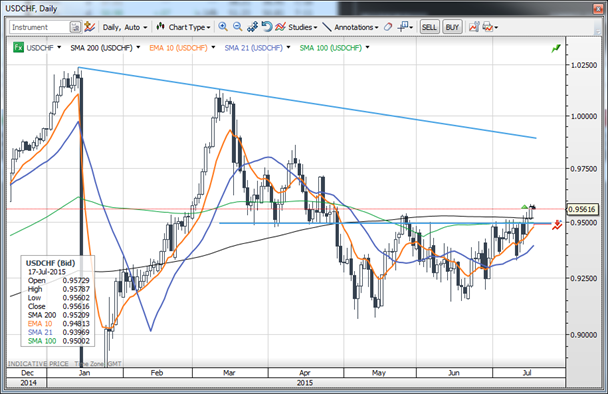The Mario Draghi press conference saw no developments of note, as much of the bandwidth was taken up by questions over Greece and emergency liquidity provision, which Draghi provided. It is interesting to note his call for structural reforms and deeper integration in the EU, reminding us where the EU must go (debt mutualisation, etc.) as we will inevitably repeat this latest Greek debacle in spades the next time the EU slips into a recession.
As for Germany and its future growth trajectory, note the reports of slowing auto sales in China, a critical market for Germany’s massive exports, and autos are its number one industry and export by a wide margin – stay tuned.
Over in England, for whatever reason, Bank of England governor Mark Carney is happy to continue talking up the prospects for rate hikes as he said in a speech late yesterday that “the decision as to when to start such a process of adjustment will likely come into sharper relief around the turn of this year“.
Very Greenspan-ish rhetoric, with the takeaway being that liftoff will arrive around year-end, or the beginning of next year. The latest bout of BoE hawkishness has the market pricing in a neck-and-neck horserace for the US Federal Reserve and BoE on which bank hikes first, with the Fed only marginally ahead at this point.
I suspect that Fed will go first – certainly in December with some potential for an “October surprise” if the data is too strong to wait until December.
One note as we head into today’s CPI data point out of the US: the surge in the US dollar unfolded in July of last year, so the year-on-year basing effects will begin to offer more support for higher inflation in the months ahead, all other factors being equal.
This may not be particularly noticeable until the October timeframe, as the oil price decline began in earnest from then. In any case, a weak year-on-year CPI reading is not worth much of our attention today.
USDCHF breaks key resistance
USDCHF has broken above the key resistance area, albeit with little fanfare and with little support in terms of EURCHF developments.
Still, a break is a break and this could generate interest among trend followers, with support now 0.9500/25 and lots of open space higher to the descending line of consolidation.

The G-10 rundown
USD: A strong week, so do we close with a flourish or on a sour note? Housing data has been quite strong of late and the CPI may not garner much attention unless it is particularly negative for the month-on-month core reading.
EUR: Weak across the board as the euro is the favourite carry trade funding currency now that the clearing of the Greek situation flashes the green light for broad risk-appetite resurgence.
JPY: Very passively trading in the background – watching interest rates for whether there is a further rise (US long end not far from highs in yields for the cycle)
GBP: Boosted by another bit of hawkish rhetoric from Carney, but the GBPUSD soufflé may be getting a bit too inflated here near the important 1.5700 level, unless today’s US data is unsupportive.
CHF: No apparent catalysts for EURCHF at the moment, but USDCHF has poked above the key resistance zone and could generate some buying interest on the trending implications.
AUD: Still embedded in the range – could weak commodity prices see its attempts to maintain the range fail and a move toward the next targets lower?
CAD: Weak oil prices keeping up the pressure and we could be taking out 1.3000 sooner rather than later, depending on today’s US data releases and the Canadian CPI number, but oil is very much in the driver’s seat here.
NZD: RBNZ up next week – this is all about where to get involved on fading upticks, and whether expectations for RBNZ cutting have run ahead of what the central bank can deliver next Thursday.
SEK: Bored to tears in EURSEK – both euro and SEK should be weak given the extremely dovish Riksbank and the popularity of euro carry trading.
NOK: EURNOK has survived its first probe at the important local 8.85 swing area, which remains the focus. Oil price weakness looks ominous for NOK, even if the currency is getting undervalued at these levels.
Upcoming Economic Calendar Highlights (all times GMT)
- Canada Jun. CPI (1230)
- US Jun. Housing Starts and Building Permits (1230)
- US Jun. CPI (1230)
- US Fed’s Fischer to Speak (1400)
- US Jul. Preliminary University of Michigan Sentiment (1400)
- New Zealand Jun. Performance of Services Index (Sun 2230)
